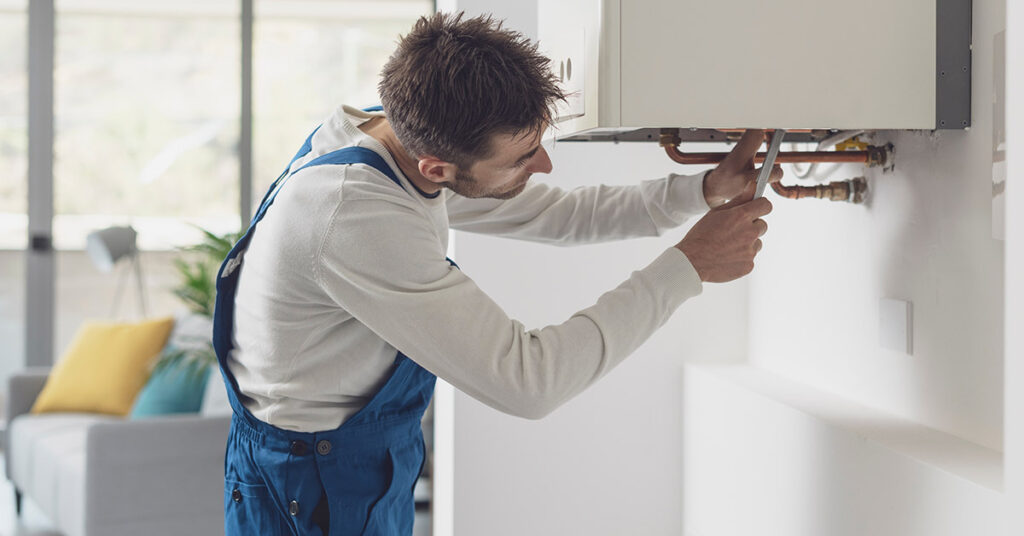When your boiler stops working, life at home can get uncomfortable fast. Cold showers, drafty rooms, and rising stress are all too common.
The good news is many boiler problems show clear warning signs before they become emergencies.
By learning how to spot these early, you can prevent costly breakdowns and keep your Rhode Island home warm and safe.
How Do You Diagnose a Boiler Problem?
You diagnose a boiler problem by checking for leaks, unusual noises, thermostat or pressure issues, and calling a professional if the fault persists.
Key Takeaways
- A boiler problem often shows up as no heat, low pressure, leaks, or unusual noises.
- Homeowners can run simple checks like thermostat settings, power supply, and pressure gauge.
- Safety comes first: never attempt repairs you’re not trained for.
- Regular maintenance helps prevent common issues and extends boiler life.
- Acorn Oil provides trusted boiler installation and service in Rhode Island.
What Homeowners in Rhode Island Need to Know First
Boilers are central to comfort in New England winters. In Rhode Island, most homes rely on them for both heating and hot water.
Before you start diagnosing, remember: boilers involve gas, oil, water, and electricity. Always prioritise safety, and if you’re unsure about routine maintenance or wondering when does a new boiler need its first service, it’s best to call a professional.
Common Boiler Problems & How to Spot Them

- No Heat or Hot Water: If your radiators stay cold or your shower won’t heat up, check the thermostat and power first. Pilot light or ignition faults are also common causes.
- Leaks (Boiler or Piping): A small drip might look harmless but can quickly cause water damage or drop system pressure. Look for puddles under the boiler or wet pipe joints.
- Low Boiler Pressure: Most systems should sit at 1–1.5 bar. If yours is below that, your radiators may not heat properly. This often points to a leak or a faulty pressure relief valve.
- Strange Noises (gurgling, banging, whistling): Boilers should run quietly. Gurgling suggests trapped air, banging may mean limescale buildup, and whistling can indicate kettling.
- Boiler Keeps Turning Off or Not Responding to Thermostat: Frequent shutoffs may signal a faulty thermostat, low water flow, or pump issues.
- Frozen Condensate Pipe / Flow Blockages: In cold Rhode Island winters, condensate pipes can freeze, shutting down the boiler. Look for ice on the outside pipe connected to the boiler.
Step-by-Step Diagnostic Checklist Homeowners Can Follow
- Safety First: What to Check Before Anything Else: Turn off the power if you smell gas or see water near electrical parts. Never remove boiler casings yourself.
- Thermostat & Power Supply: Check thermostat batteries, settings, and ensure the boiler is receiving power. A tripped breaker could be the culprit.
- Pressure & Water Levels: Look at the gauge on the boiler. If it’s under 1 bar, the system may need repressurizing.
- Visual Inspections: Leaks, Corrosion, Connections: Scan pipes and joints around the boiler. Rust, water spots, or white limescale marks suggest leaks.
- Listening: Noises, Unusual Sounds: Stand near the unit when it’s running. Note any gurgles, bangs, or whistling, as these help a technician diagnose the fault faster.
When It’s Time to Call a Professional
If basic checks don’t solve the issue, it’s time to call in an expert. When you’re already asking yourself why is my furnace leaking water or dealing with potential problems like faulty gas valves, pumps, or ignition systems, it’s important to remember that these situations should never be handled without proper training.
Delaying can lead to higher repair costs, efficiency loss, or even safety risks like carbon monoxide leaks—issues that are far less likely when you stay proactive about boiler replacement and installation in Providence.
How Acorn Oil Approaches Boiler Diagnostics in Rhode Island
At Acorn Oil, we know Rhode Island winters demand reliable heating. Our technicians combine hands-on inspection with advanced diagnostic tools to pinpoint issues fast.
Whether it’s an oil boiler losing pressure or a frozen pipe shutting down your system, our team provides solutions that restore comfort quickly.
Preventative Maintenance Tips to Avoid Boiler Problems
- Schedule annual servicing before winter.
- Bleed radiators to release trapped air.
- Insulate outdoor condensate pipes to prevent freezing.
- Check pressure regularly and top up if needed.
- Keep boiler vents and intakes free from blockages.
A little maintenance goes a long way toward extending the life of your boiler.
Frequently Asked Questions
1. Why is my boiler losing pressure?
Usually because of leaks, a faulty valve, or bleeding radiators.
2. What causes a boiler to make noise?
Air, limescale buildup, or pump issues can cause banging or whistling.
3. Can a frozen condensate pipe shut off the boiler?
Yes. When blocked by ice, the boiler shuts down to prevent damage.
4. How often should I service my boiler in Rhode Island?
At least once a year, ideally before winter.
5. Is it safe to reset my boiler myself?
Yes, if your manual allows it. But repeated resets mean a deeper issue.
6. Why does my boiler keep turning off?
Low water pressure, thermostat faults, or pump failures may be to blame.
7. Should I repair or replace my old boiler?
If repairs are frequent or the unit is over 15 years old, replacement is usually better.
Conclusion
Diagnosing a boiler problem doesn’t have to be overwhelming. With a few simple checks, you can spot the signs early and know when it’s time to call a professional.
If you’re looking for expert boiler installation or service in Rhode Island, Acorn Oil is here to help. Our team ensures your home stays warm, safe, and energy-efficient all winter long.